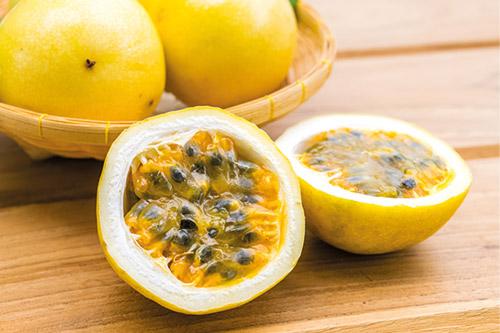
Passionflower is a climbing plant which can reach considerable dimensions, up to 10 meters, and produces a very particular and palatable edible fruit called "passion fruit".
there two varieties of passiflora edulis: the granadilla with yellow or orange peel fruit, and the passion fruit with red or violet fruit.
The dimensions of the passion fruit they are about those of a peach, with an ovoid shape and the name in Spanish means “grenade” precisely because it recalls the pomegranate which in Spanish has the same identification name.
Originally from the countries of South America, it was imported by the Spaniards to Europe: its cultivation has also spread as ornamental plant thanks to its aesthetically very particular flowers. Some of these ornamental varieties are edible and produce orange or other colored fruits smaller in size than granadilla or passion fruit.
The fruit of the passionflower has a thick, almost leathery-woody skin that contains many seeds immersed in a juicy jelly. The taste is sweet with a very sour note. Depending on the variety its acidity it can be more or less marked, due to the presence of vitamin C.
Composition of the fruit of passionflower
The nutritional substances that we find in the passion flower fruit are mainly vitamins A, B, E and C. It is also rich in mineral salts especially iron, copper, phosphorus and potassium. The fruit contains numerous sugars and mucilages that give it a caloric intake from 3 to 60 kcal per 100 grams of fruit.
Among the passion flowers, the “embodied” variety belongs to the medicinal plants with stronger healing properties compared to other varieties of granadilla and passion fruit.
In fact, in the officinal passionflower we find active ingredients such as flavonoids e alkaloids with excellent healing properties.
Usually the officinal variety of passion flower is used the leaf for beneficial purposes with an anxiolytic and calming effect in fact indicated in cases of agitation, stress, anxiety and sleep problems.
Goodbye insomnia thanks to passion flower
Properties and benefits of passionflower fruit
Given its composition it is interesting to know that the presence of vitamin C helps better absorb iron and therefore becomes an optimum fruit anti anemia, which supports the whole organism in case of low energy and nervous exhaustion. Plus vitamin C strengthens the immune system counteracting infectious agents and generally works as an anti-inflammatory and antioxidant.
The strong presence of potassium, which even reaches to equal the dose of 3 bananas, is suitable for those suffering from water retention: it is precisely potassium that allows a good regulation of the fluids that thus maintain regular blood pressure and avoid any swelling in the legs.
Due to its composition in general it also helps against gastritis and colitis and the mucilages present in the fruit are fibers that help reduce swelling and meteorism and therefore soothe all forms of intestinal inflammation.
It has many nutrients with antioxidant activities and is useful for preventing cardiovascular diseases and nervous exhaustion: in the country of origin along the banks of the Amazon River it was used by the natives as a pain reliever and sedative.
Also find out what are the side effects of passionflower
In the kitchen the fruit of passionflower
The scent emanating from the fruit and the slightly wrinkled skin are the indicators that the best ripeness has been reached and therefore it is possible to eat it.
Passionflower is a fruit that we can taste naturally, simply by cutting the fruit in half and savoring with a teaspoon the internal jelly with the seeds that the teeth break without any problem.
In exotic smoothies, even with the addition of yogurt or other vegetable milks, it can be an excellent ingredient especially in summer. We use care for centrifuges and extractors because it is necessary to check if the extractor machine has enough power to pass the seeds otherwise there is a risk of breaking the appliance.
It is used to prepare jams, mousses, sorbets, creams or to prepare accompanying sauces even for main courses of roast. Obviously it is an ingredient in many exotic cocktails typical of hot countries.
Read more about passion flower fruits and other exotic fruits


























